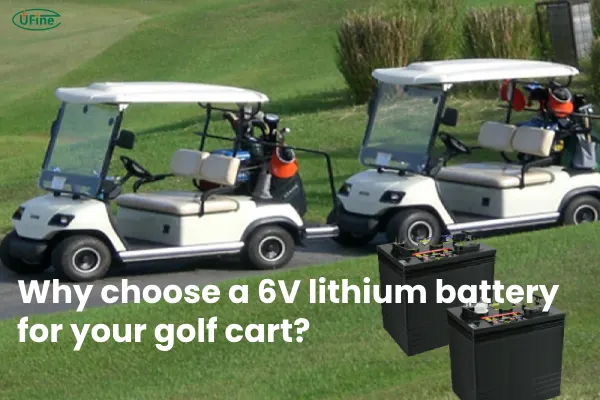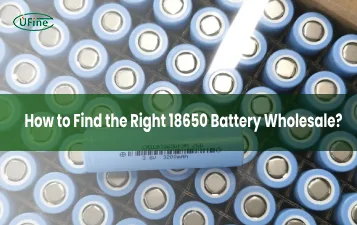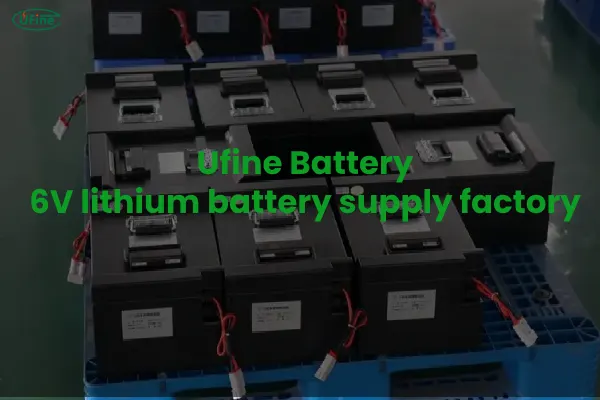Part 1. Upgrade to lithium: why choose a 6V lithium battery for your golf cart?
Upgrading your golf cart to a 6V lithium battery offers a multitude of advantages compared to traditional lead-acid batteries. Here’s why more and more golf cart owners are making the switch:
- Longer Lifespan: Lithium batteries can last up to 5 times longer than lead-acid batteries, providing years of dependable use.
- Faster Charging: Lithium batteries can be fully charged in a fraction of the time it takes to charge a lead-acid battery.
- Higher Efficiency: Lithium batteries operate at a higher efficiency, translating into more energy per charge.
- Lightweight: They are much lighter than lead-acid batteries, improving your cart’s performance and reducing overall weight.
- No Maintenance: Unlike lead-acid batteries, lithium batteries don’t require regular maintenance, such as topping off water levels.

At Ufine Battery, we manufacture custom 6V lithium batteries for golf carts, with over 17 years of experience. Whether you need a small upgrade or a complete system, our team can provide a tailored solution to meet your needs.
Part 2. How does a 6V lithium battery compare to 8V and 12V batteries?
When it comes to golf cart batteries, 6V, 8V, and 12V are the most common options. But how do they compare, especially in terms of performance and compatibility?
6V Lithium Battery
- Capacity: Offers excellent capacity for lighter golf carts or smaller systems.
- Cost: Generally more cost-effective for moderate use compared to 12V systems.
- Performance: Provides steady and efficient performance for flat terrain and light usage.
8V Lithium Battery
- Capacity: Slightly higher capacity than a 6V battery, making it a good middle ground for those needing more power.
- Cost: More expensive than 6V batteries, but still cheaper than 12V lithium batteries.
- Performance: Best for carts that require slightly more power or longer range but still maintain a lightweight profile.
12V Lithium Battery
- Capacity: Has the highest capacity among the three, often preferred for larger golf carts or more demanding applications.
- Cost: Generally the most expensive option for upgrading to lithium.
- Performance: Best for those who want superior performance on hills, longer distances, and faster speeds.
The choice between 6V, 8V, and 12V lithium batteries depends on your golf cart’s power needs, budget, and intended usage.
Part 3. How long can a 6V lithium battery power a golf cart?
The runtime of a 6V lithium battery depends on multiple factors such as the capacity (Ah), current draw, and usage conditions. On average:
For light usage on flat terrain: A 6V 100Ah battery can provide approximately 8-10 hours of runtime.
For heavy use (e.g., steep hills, faster speeds): The runtime will be closer to 4-5 hours.
If you need a higher capacity for longer usage, consider a 12V or 48V system that uses multiple 6V lithium batteries connected in series.
Part 4. Cost considerations
While 6V lithium batteries have a higher upfront cost compared to traditional lead-acid batteries, they offer long-term savings due to their longer lifespan, faster charging, and lower maintenance requirements.
- 6V Lithium Battery (100Ah): Prices range from $350 to $600 per battery, depending on the brand and capacity.
- Lead-Acid Battery (6V): Prices typically range from $100 to $150 but last significantly shorter (about 2-3 years).
When calculating long-term costs, lithium batteries are more cost-effective due to their 5-10 year lifespan, while lead-acid batteries typically need to be replaced every 2-3 years.
Part 5. Maintenance and longevity
Unlike lead-acid batteries, 6V lithium batteries require minimal maintenance. Here’s how to ensure your 6V lithium battery performs optimally over the years:
- Avoid deep discharges: Refrain from letting the battery drop below 20% charge regularly, as this can shorten its lifespan.
- Use the correct charger: Always use a lithium-specific charger to avoid overcharging or undercharging, which can harm the battery.
- Regular checks: While lithium batteries are low-maintenance, it’s still advisable to check connections for any corrosion or loose wires.
A properly maintained 6V lithium battery can last between 5 to 10 years, far outlasting traditional lead-acid batteries.
Part 6. Charging time of 6V lithium batteries
One of the major advantages of upgrading to a 6V lithium battery is the shorter charging time:
A 6V lithium battery with a 100Ah capacity can be fully charged in 4-6 hours using a compatible lithium charger.
In comparison, a 6V lead-acid battery takes 8-12 hours to charge fully.
This faster charging time is particularly beneficial for golf cart owners who need to recharge quickly between rounds or during breaks.
Part 7. Safety of 6V lithium batteries
Lithium batteries are generally safe when used correctly. However, it is important to follow safety guidelines to prevent potential issues:
- Overcharging: Always use a charger designed for lithium batteries to avoid overcharging.
- Temperature extremes: Avoid exposing the battery to extreme heat or cold, as this can affect the chemical composition and reduce its efficiency.
- Proper storage: Store the battery in a cool, dry place to prevent damage.
At Ufine Battery, we provide high-quality lithium batteries that meet strict safety standards to ensure peace of mind.
Part 8. Performance in cold and hot weather
Cold Weather:
6V lithium batteries generally perform well in cold temperatures, but their efficiency can drop if temperatures fall below 32°F (0°C).
It’s recommended to store and use lithium batteries in temperatures above 32°F for optimal performance.
Hot Weather:
High temperatures can degrade lithium batteries faster and reduce their overall lifespan.
Avoid overcharging or storing your battery in direct sunlight, as this can cause the battery to overheat and decrease its performance.
Part 9. Where to buy 6V lithium golf gart batteries
You can purchase 6V lithium batteries for golf carts from various retailers, including:
- Online platforms like Amazon, eBay, or specialized battery retailers.
- Local golf cart dealerships or battery shops.
- Direct from manufacturers like Ufine Battery, where you can get customized solutions to meet your specific needs.
Part 10. Which brands offer the best 6V golf cart lithium batteries?
Several brands are known for producing high-quality 6V lithium batteries for golf carts:
- Trojan: Known for durable and efficient lithium-ion options.
- Relion: Offers a variety of reliable lithium battery models.
- Ufine Battery: As a leading custom lithium battery manufacturer, we provide high-performance batteries designed for golf carts, ensuring maximum efficiency and lifespan.
Part 11. What maintenance is required for 6V lithium batteries?
While 6V lithium batteries require much less maintenance than lead-acid batteries, here are a few things you should do:
- Monitor the charge levels regularly to ensure they don’t drop too low.
- Keep the terminals clean and free from corrosion.
- Avoid overcharging by using a lithium-compatible charger.
Part 12. FAQs
-
Can I use a 6V lithium battery in cold temperatures?
Yes, 6V lithium batteries can operate in cold temperatures, but their performance may be reduced below 32°F (0°C). It’s best to store the battery in a warmer environment when not in use to ensure maximum efficiency and longevity. -
Are 6V lithium batteries compatible with all golf cart models?
Most modern golf carts are compatible with 6V lithium batteries, but it’s essential to check your specific model’s voltage and space requirements. If in doubt, consult with a battery expert or your golf cart manufacturer. -
How do 6V lithium batteries compare to AGM (Absorbent Glass Mat) batteries for golf carts?
AGM batteries are a type of lead-acid battery. While they’re maintenance-free, 6V lithium batteries offer far better performance, longer lifespan, faster charging, and are significantly lighter than AGM batteries. The higher upfront cost of lithium is offset by long-term savings. -
Can a 6V lithium battery be overcharged?
No, most 6V lithium batteries come with built-in battery management systems (BMS) to prevent overcharging. However, it’s still crucial to use a lithium-compatible charger to avoid any issues and ensure safe charging practices. -
What’s the environmental impact of using 6V lithium batteries?
Lithium batteries are more environmentally friendly compared to traditional lead-acid batteries. They contain fewer toxic materials, are more energy-efficient, and can be recycled at the end of their life cycle, which makes them a more sustainable option in the long run.
Related Tags:
More Articles

Where to Find the Right 18650 Battery Wholesale?
Discover how to choose a reliable 18650 battery wholesale supplier, compare prices, ensure safety, and avoid common buying mistakes.
18650 Battery Short Circuit: Risks and Safety Tips
Discover what happens during a 18650 battery short circuit, warning signs, and how to avoid fire, damage, and hazardous failures in your devices.
LiPo Battery Discharge Rate Guide & Calculation Tips
Understand LiPo battery discharge rates, C-ratings, and how to calculate max current. Essential guide for RC, drones, and electronics users.
High‑Capacity 3S LiPo Batteries: 5000 mAh vs. 10000 mAh
Compare 3S LiPo 5000mAh vs 10000mAh batteries by weight, power, and use. Find the best fit for your drone, RC car, or boat setup.
Top 5 Applications for Small 3S LiPo Batteries
Small 3S LiPo batteries power drones, RC gear, wearables, and robotics with high energy and low weight. Making them ideal for compact electronics projects.




